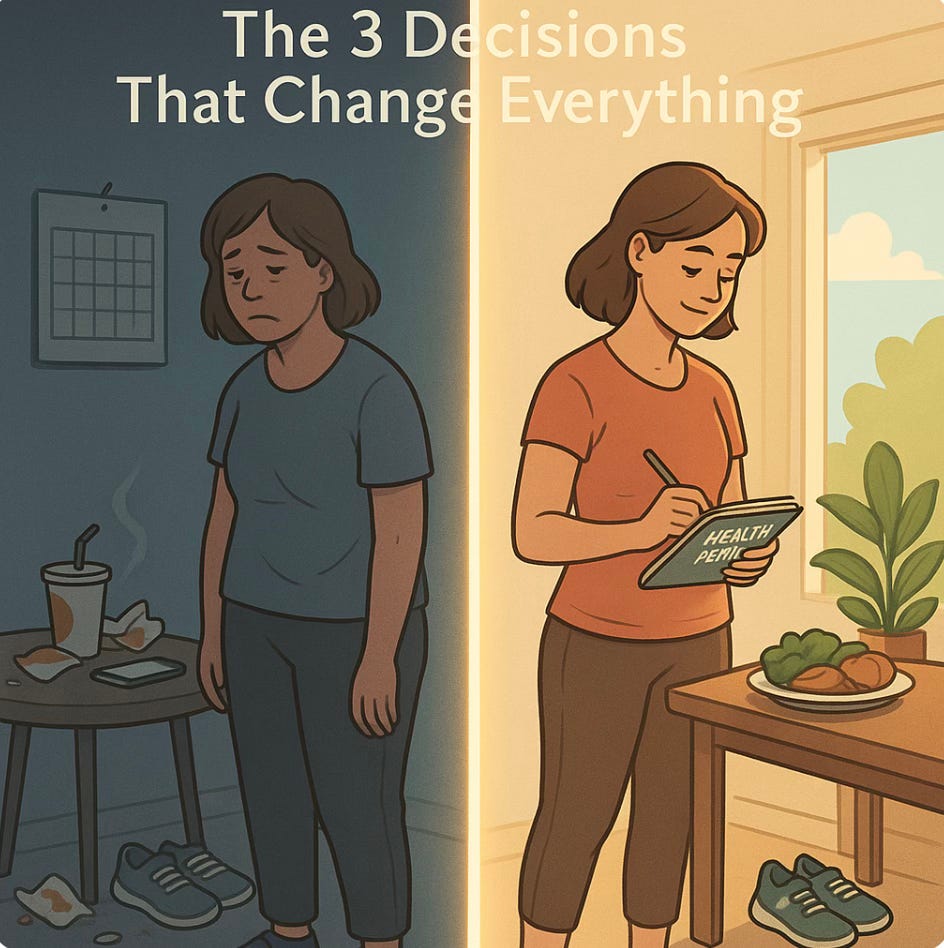The 3 Decisions That Change Everything About Your Health
Apply the Rules of Financial Success to the One Asset You Can’t Afford to Lose
If your doctor handed you a check for a million dollars but said, “You’ll need to give up your pancreas, your sleep, and half your brainpower,” would you cash it?
Because that’s the trade most people are already making…just slowly. Quietly. One skipped walk. One ultra-processed meal. One late night at a time.
Here’s the uncomfortable truth no one’s saying: Most people aren’t waiting for motivation.
They’re waiting too long to decide.
And not just once. There are three pivotal decisions that determine whether your health spirals or transforms, whether you drift or thrive. You’ll see them clearly in just a moment.
But first, let’s start where real transformation begins: with the value you assign to your own well-being.
Health Is Priceless. Start Acting Like It.
People who build real wealth don’t do it with luck. They do it by treating time and money like sacred assets, protecting them, multiplying them, obsessing over every wasteful leak.
What if you did the same with your health?
Right now, most people treat their health like a leftovers container in the fridge—meh, I’ll deal with it later. Until the lid pops and the damage is harder (and more expensive) to clean up.
But the people who live with energy, clarity, and resilience?
They act like their health is non-negotiable. Like every bite, every hour of sleep, and every decision about movement or stillness is a down payment on their future.
They’re not “trying to be healthy.” They’ve decided that health is part of their identity. They protect it the way a great investor protects capital.
Backed by behavior science: Studies show that when you assign high personal value to your health, when you truly see it as essential to the life you want, you’re significantly more likely to follow through on the daily habits that build it.
Here’s the rub: until you value your body the way you value your time or bank account, you’ll keep treating it like it’s optional.
Want a simple reset? Try this:
Write down your top 3 goals for the next 10 years.
Then ask: “What happens to those goals if my health fails?”
That’s not drama. That’s reality.
Energy Follows Obsession. Choose Wisely.
Let’s dismantle one of the most comforting lies in wellness culture:
“Everything in moderation.”
That sounds nice. Until you realize it’s exactly how most people end up moderately sick, moderately tired, and moderately unhappy.
The truth is, the people who change their lives don’t dabble in health.
They obsess.
• They meal prep like it’s mission-critical.
• They walk daily, even if it’s raining.
• They go to bed like their life depends on it, because it does.
• They automate the boring parts so they never skip the important ones.
This isn’t about being extreme. It’s about being focused.
Like a laser instead of a flashlight.
The science backs it up: Once health-promoting behaviors are repeated long enough (usually 6 months), they move into the “maintenance phase” of behavior change, they become automatic, low-effort, and identity-linked.
It’s not magic. It’s momentum.
But momentum doesn’t come from balance.
It comes from intensity in the right direction.
The question is: where is your energy going now? If it’s being bled out by decision fatigue, digital noise, or half-hearted goals, no wonder your health feels hard to sustain.
The solution isn’t more effort. It’s better obsession.
Don’t Resist Temptation. Delete It.
Most people think the key to better habits is more willpower.
It’s not.
It’s removing the choice.
In behavioral economics, there’s a concept called “default architecture.” Change the environment, and behavior follows. Want people to eat better? Change the school lunch line. Want them to move more? Remove escalators.
Now apply it to your fridge. Your living room. Your calendar.
• If junk food is in your house, you’ll eventually eat it.
• If your phone’s on your nightstand, you’ll eventually scroll.
• If your sneakers are buried in a closet, you’ll eventually skip your walk.
This isn’t a character flaw. It’s context design.
Public health policies already do this: Taxes on soda. Bans on cigarette ads. Restrictions on junk food near schools. Why? Because limiting access changes behavior, even without changing beliefs.
You can run your own version of this, starting today.
Delete the option: Don’t buy it, don’t store it, don’t see it.
Add friction: Put your phone in a different room.
Create “forcing functions”: Invite a friend on a walk. Commit publicly. Set up consequences.
Don’t waste time arguing with your future cravings.
Just make sure they have nothing to grab onto.
You Don’t Need More Tips. You Need a System.
Let’s step back.
Every person who transforms their health makes three decisions, whether they realize it or not:
They decide their health is priceless.
They direct their energy like a laser—not a scatterplot.
They remove unhealthy options like an engineer—not a preacher.
And when they do? Health stops being hard.
It becomes who they are.
If you’ve struggled before, it’s not because you’re a failure.
It’s because your decisions didn’t align with your future self.
That changes now.
Ready to See the System Mapped Out?
I’ve created a Health Wealth Decision Map that walks you through:
• How to set an internal “value bar” for your health
• The exact high-leverage habits to focus your energy on
• Environmental edits that eliminate temptation and reduce relapse
• Reflection prompts that tie every action to a higher identity
Join The Habit Healers Mindset’s Inner Circle to download it instantly.
Your body is the asset that makes every other dream possible.
Let’s treat it like it.
Because you’re not one big decision away.
You’re one healing habit away.





